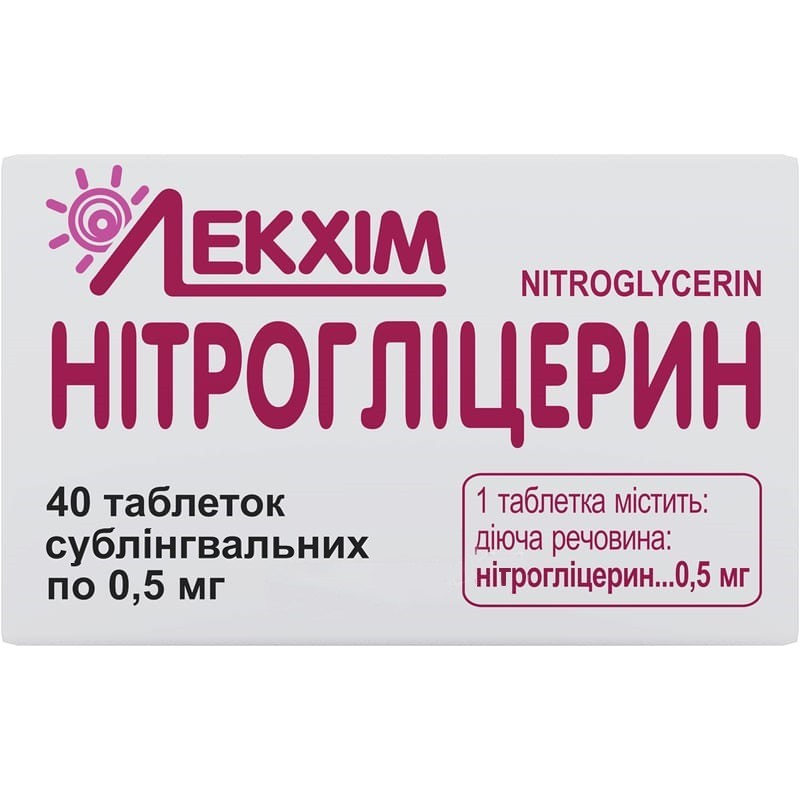



 Secure and encrypted payment processing
Secure and encrypted payment processing We ship to over 40 countries including the USA, UK, Europe, Australia and Japan
We ship to over 40 countries including the USA, UK, Europe, Australia and Japan Guaranteed refund or reship if you haven't received your order
Guaranteed refund or reship if you haven't received your orderNitroglycerin (1,2,3-propanetriol trinitrate) is an antianginal drug that promotes the formation of nitric oxide in smooth muscles. reduces preload on the heart due to the expansion of peripheral veins. a decrease in blood flow to the right atrium helps to reduce pressure in the pulmonary circulation. the drug reduces the afterload on the heart due to the expansion of the arteries. reduces myocardial oxygen demand, reducing pre- and afterload. in addition, the drug contributes to the redistribution of coronary blood flow in the area with reduced blood circulation. increases exercise tolerance in patients with coronary artery disease and angina pectoris.
With sublingual administration, a therapeutic plasma concentration is reached within a few minutes. Bioavailability is 100%. Metabolized in the liver with the participation of nitrate reductase. Plasma protein binding is 60%. The half-life with sublingual administration is 20 minutes. It is excreted mainly by the kidneys.
Relief of angina attacks; myocardial infarction (as part of complex therapy); acute left ventricular failure (as part of complex therapy).
Apply sublingually. the dose and treatment regimen are set individually depending on the indications, the specific clinical situation.
When stopping angina attacks: immediately after the onset of pain, one tablet is placed under the tongue and held in the mouth until completely absorbed without swallowing. Typically, the antianginal effect is evident after 0.5–2 minutes. In the absence of antianginal action within 3-5 minutes, you need to take another pill.
Shock, collapse, ag (systolic hell below 100 mm Hg, diastolic hell below 60 mm Hg), acute myocardial infarction with low left ventricular filling pressure, hypertrophic obstructive cardiomyopathy, increased intracranial pressure (including hemorrhagic stroke, after a recent head injury), angle-closure glaucoma with high intraocular pressure, hypersensitivity to nitrates, concomitant use with sildenafil.
Dizziness, headache, tachycardia, hyperemia of the skin, sensation of heat, hypotension are possible; rarely (with an overdose) collapse, cyanosis; nausea, vomiting; in some cases, allergic reactions (skin rash, itching).
It is used with caution in patients with severe cerebral arteriosclerosis, cerebrovascular accidents, with a tendency to orthostatic hypotension, with severe anemia, in elderly patients, as well as with hypovolemia and severe impaired liver and kidney function. do not allow alcohol during treatment. nitroglycerin can reduce the rate of psychomotor reactions, which should be considered when driving vehicles or engaging in other potentially dangerous activities.
The use of nitroglycerin during pregnancy and lactation is possible only if the expected benefit to the mother outweighs the potential risk to the fetus or infant.
With simultaneous use with other vasodilators, apf inhibitors, calcium channel blockers, β-adrenoreceptor blockers, diuretics, tricyclic antidepressants, MAO inhibitors, sildenafil, ethanol and ethanol-containing drugs, an increase in the hypotensive effect of nitroglycerin is observed; with β-adrenergic blockers, calcium antagonists - increased antianginal action; with dihydroergotamine - it is possible to increase its concentration in blood plasma. the use of nitroglycerin simultaneously with quinidine or procainamide can cause orthostatic collapse.
Symptoms include headache, dizziness, tachycardia, nausea and vomiting, arterial hypotension, sensation of heat or chills, increased sweating, dyspnea, increased intracranial pressure (brain symptoms up to the development of seizures and coma), methemoglobinemia (cyanosis and tachypnea).
Treatment - to give the patient a horizontal position (legs raise above the level of the head), injected plasma substitutes, sympathomimetics, give oxygen. To eliminate methemoglobinemia, methylene blue is the drug of choice.
In a dry, cool, dark place.